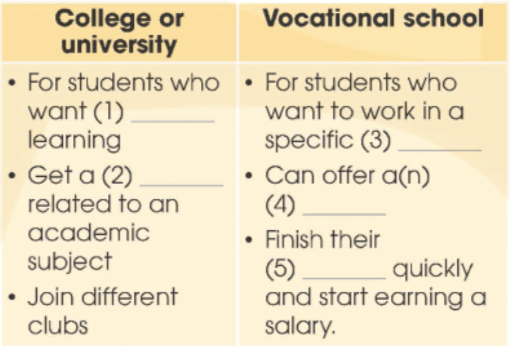Câu hỏi:
59 lượt xemRead the article again and complete each gap with ONE word. (Đọc bài viết một lần nữa và hoàn thành mỗi khoảng trống với MỘT từ)
Lời giải
Hướng dẫn giải:
|
1. formal |
2. degree |
3. trade |
|
4. apprenticeship |
5. shorter |
|
Hướng dẫn dịch:
|
Cao đẳng hay đại học |
Trường dạy nghề |
|
Dành cho học viên muốn học chính quy
Nhận bằng cấp liên quan đến một chủ đề học thuật
Tham gia các câu lạc bộ khác nhau |
Dành cho sinh viên muốn làm việc trong một ngành nghề cụ thể
Có thể cung cấp một học nghề
Kết thúc khóa đào tạo của họ một cách nhanh chóng và bắt đầu kiếm tiền lương. |
Read the article. Match the highlighted words with their meanings. (Đọc bài viết. Nối các từ được đánh dấu với ý nghĩa của chúng)
THE EDUCATIONAL JOURNEY FOR SCHOOL-LEAVERS
This month, Teen Talk magazine has received many letters from secondary school students asking about the different options for school-leavers. We've talked to educational experts, and they think that young people should either continue their studies at a college or university or go to a vocational school.
A. ______________________
Higher education is really for people who want formal learning in order to get an academic degree. If you are good at certain subjects and need a degree related to those subjects, then university is the right choice for you. Besides studying, university students also have the opportunity to live independently, make new friends, and join different clubs. Many students still manage to work part-time during their university years. In addition, college or university students usually have an advantage over students from vocational schools when it comes to further studies after a degree. They will also have broader career options and an advantage in the job market.
B. ______________________
If you are not interested in traditional academic subjects and want to work ina specific trade, then vocational education is the right choice for you. You will gain the practical skills and knowledge necessary for a specific job. In addition, a vocational school may also offer you an apprenticeship. This type of training not only provides students with hands-on experience, but also gives them wages to cover their living costs. Most importantly, vocational training is usually much shorter than a college or university course. After getting their vocational qualifications, graduates can immediately start work and earn a salary.
There are a lot of educational opportunities for school-leavers today. You can choose from hundreds of vocational schools or higher education institutions to continue your educational journey.
|
1. formal |
a. a job that requires special training and skills |
|
2. manage |
b. a period of time working for and leaning from a skilled person |
|
3. trade |
c. to succeed in doing something difficult |
|
4. apprenticeship |
d. important organisations that have a particular purpose |
|
5. institutions |
e. Received in a school, college, or university, with lessons, exams, etc. |


